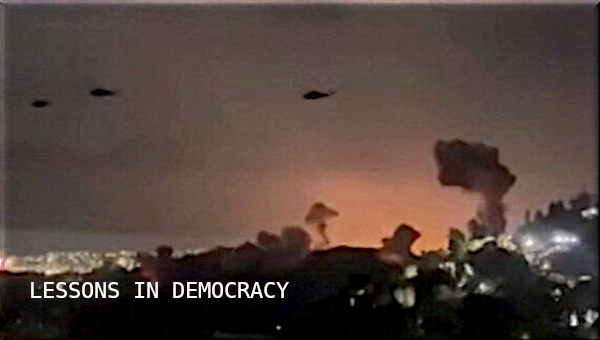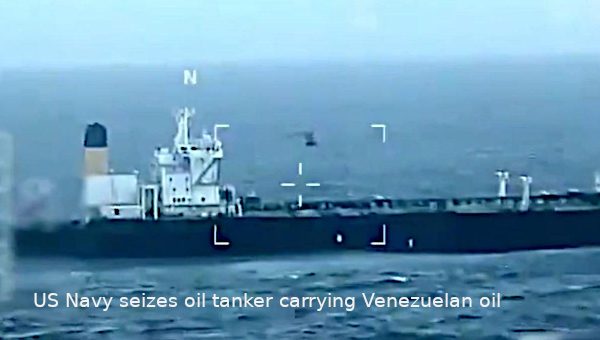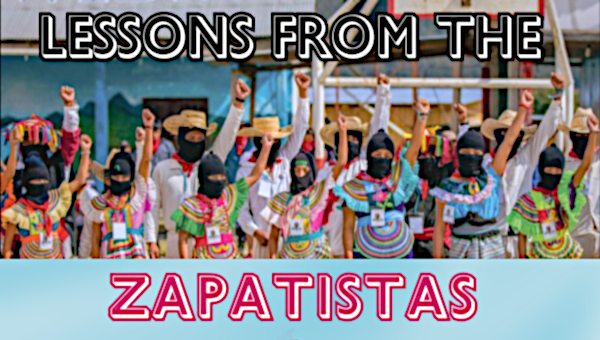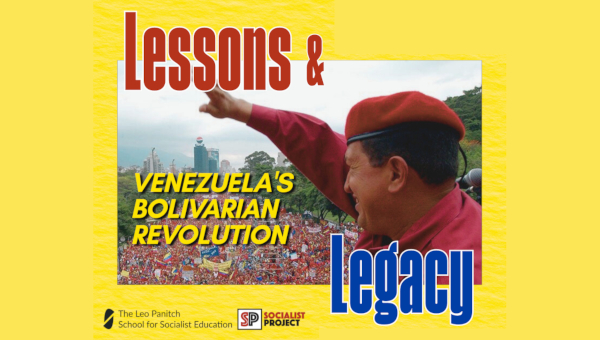Resisting Empire and Injustice Through Fiction
Empire and injustice are not abstract concepts – they shape our daily lives. Awareness alone won’t change that. We can read the news, digest the facts, but change requires more than information; it demands emotional connection, imagination, a vision for something different, and a willingness to dismantle the systems that uphold these injustices. Storytelling is crucial in this process. It allows us to understand and challenge the status quo, to resist, and to create the futures we need.
In this conversation, we explore the radical potential of fiction for resisting empire and injustice with Tamara Pearson, an Australian-Mexican journalist, editor, activist, and author whose work spans investigative journalism and literary fiction. She has long written about the intersections of global inequality, imperialism, migration, and ecological destruction, with a particular focus on the US’s unhealthy relationship with Latin America. Her newest novel, The Eyes of the Earth, is a heartfelt and captivating work of magical realism set in Mexico City, where the story of an elderly refugee – unnoticed, quietly heroic, and determined to find a bed to finally rest in – unfolds amidst a city beset by the forces of empire.
In the novel, Pearson invites us to witness unseen magic and beauty as the protagonist navigates a world built on systemic violence, surprising everyone by turning it upside down. The Eyes of the Earth is not just a story of survival; it is a narrative of defiance against the literal and metaphorical monsters of empire – it lays bare the bones of the world, decodes injustice, unravels inequality, rescues dignity, and reveals the essence of humanity: its pains and potential.
Storytelling becomes a vital act of resistance, a way to recognize and reground in shared humanity across the false divides of power and nation, and a way to dismantle structures that harm to create space for something better.
Alexandria Shaner (AS): Your newest novel, The Eyes of the Earth, was just launched at a webinar under the theme of “Resisting Empire and Injustice Through Storytelling and Fiction.” Could you start by explaining what this theme means to you? How does fiction promote critical political literacy?
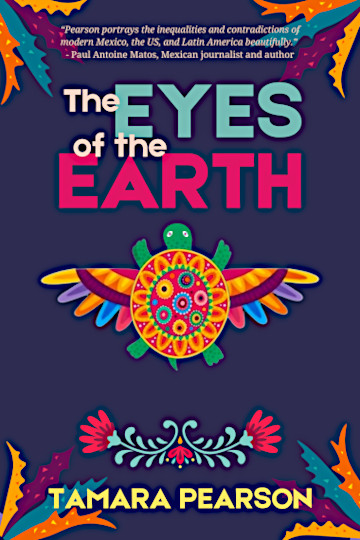
Tamara Pearson (TP): There are whole narrative systems used in Hollywood, in schools, and in the media, to celebrate and glorify colonisation – the initial invasions (often framed as ‘discoveries’) and then the systems of domination and control that were implemented. Those power dynamics continue today via imperialism, economic control of the Global South by the Global North, unfair trade agreements, and so on, and language is used to make the conquerors out to be the heroes (the US ‘brought democracy’ when it was bombing Afghanistan and Iraq, and so on).
We need to be able to unravel this kind of discourse, show it up for what it is, and then tell our own stories that reveal what has actually happened and is happening. There are various useful mediums for communicating realities, from investigative journalism through to non-fiction, art, and music, but fiction is especially important. It is so open and free and full of imagination that I find that it’s often where we can be most honest and real. We can use metaphors, characters, and plot to address the big ideas, the lasting traumas, to ask questions, and to imagine.
Strong stories have a way of being memorable and staying with us because they are able to touch the rawest pain and other intangible things like dreams, which journalism, for example, can’t. And we have to be careful not to be too dismissive of things like hope, dreams, possibilities, and generational trauma. After all, activism and social change require deep sensibility as well as ongoing political analysis. Political literacy is very much about understanding how global economic and political powers work, and fiction can describe and provoke reflection about these things in very sincere and profound ways.
AS: As an activist, journalist, and novelist, your work involves being both observer and storyteller – practices that are essential for social change but also for healthy societies in general. Could you comment on your experience developing as a listener and a communicator? How can we better notice what often goes unseen and give voice to it in ways that promote the spreading of awareness itself?
TP: I think we have to be humble to listen well, and to deeply appreciate the experiences and wisdom of people we’re talking to (listening to) and value the world around us. Those who struggle to listen to others – some men when interacting with women, for example – often don’t respect those people. But when we really appreciate people or a city or landscape, it is easier to listen and observe well.
We also need to understand what it is that determines who (which social classes) is heard, and who is invisible, and how that happens. Something like 90% of so-called global news in the mainstream media is focused on the Global North; on Europe and the US, Australia, Canada. Racist and classist positions underlie the decision the media makes to cover news in some countries while overlooking others. Likewise, the social media algorithms that put certain wealthy people and actors in the spotlight and that feed people content that objectifies women and so on. Humans write those algorithms, and they also reflect society’s dominant values – values that have been fostered by people with power in order to maintain that power. Understanding how we learn helps us to learn better, and understanding how we see, and what goes into what we see, helps us to see with more clarity. My novel uses sight a lot, with one character going largely unseen and another character seems to have veils covering his eyes.
AS: Introduce us to the heroine of your novel, La Tortuga. Who is she and what is the world we discover through her?
TP: La Tortuga is the main unseen character. She’s from the Global South – from Honduras, and has just fled her country to Mexico. As an old woman refugee, she’s very invisible, and she does heroic and magical things that few notice. Not unlike the real world, where the heroes we’re given are the James Bonds and Supermen (young, physically strong, Global North and white men) but the real heroes, I think, are the refugees who cross seas on boats or who walk for months through Central America and Mexico. La Tortuga, because of her age and her ability to listen, has managed to accumulate huge amounts of wisdom, and she uses that wisdom to help her survive, and to take on seemingly impossible battles. She’s trying to find somewhere to sleep in Mexico City, and so through her we also get to know that city, almost as if it were a character itself.
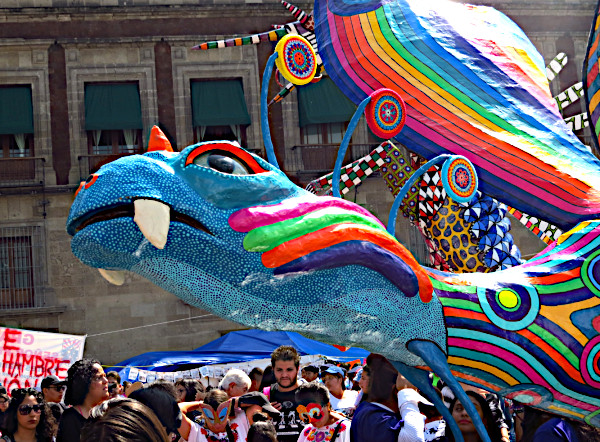
AS: Throughout The Eyes of the Earth, each human is accompanied by their alebrije, diverse and fantastical creatures that seem to be both a soul manifestation and a reflection of life experiences. What is an alebrije and what is their significance in this story?
TP: Alebrijes are a Mexican art form – they are fantastical animals that are usually carved out of wood or constructed with papier-mache then painted in wonderfully bold colors. Mexico City has an annual alebrije parade, where towns and schools and other groups or collectives contribute a giant alebrije they have made, and often named.
In the novel, I take alebrijes a step further and bring them to life, as visual manifestations of each person’s essence. They represent how diverse and interesting people are, but also how that person is evolving, coping, and relating to things. Ultimately, the alebrijes are humanity, and I can use them in the story to show what our humanity is up to and what is happening to it.
AS: The character of Harry, a young American-tourist Youtuber, is interesting in that he seems to understand instinctively that he is part of a deeply unjust world and carries a crippling loneliness and guilt. He wants “to learn” and to “do some good in the world.” Yet, it seems that the closer Harry gets to confronting the bigger truths about where and how he fits into this unjust world, the more he throws up defensive walls and refuses to truly see justice. Could you talk about this character and what he represents?
TP: Harry is visiting Mexico City and develops a problematic friendship with La Tortuga which is ultimately a portrayal of the US’s relationship with Latin America, or the Global North’s relationship with the Global South. Harry, like many people who live in the US or Europe, usually has good intentions, but he doesn’t know how to listen to La Tortuga or how to truly help her. He often ends up making things worse for her.
Both La Tortuga and Harry are new to Mexico, but they come from different countries. This single difference greatly affects the freedom they experience and the way they are treated. They are both travelers, but one is a refugee, and one is a tourist, and I hope this contrast helps us to reflect on how we move about in the world, what we expect when visiting another country for example, and how different kinds of travelers are treated differently.
AS: While much becomes naturally politicized throughout the novel, woven through the story are zoomed out and more overtly political vignettes. One particularly clarifying passage reads:
“People from Andean coffee farms went into the big cities and took photos of the strange ways of being of the locals. They were amused by the colourful costumes, the abject and sad expressions and the skills of road repairers and construction workers. Zimbabweans, Bolivians, Guatemalans, and Haitians went on cruises around the Australian coast and on safaris through the strange landscapes of northern England. Venezuelan, Iranian, and Honduran journalists observed the presidential elections in the US, reported for the global media networks on all the abnormalities and undemocratic elements, and provided the main expert analysis of the situation. A Burkinabé tourist went missing for a day in Toronto, and the media was all over it. Senegalese people went to France to teach locals how to repair their roofs and to take photos with the little French children.”
AS: Could you discuss showing the political nature of the world vs explaining it?
TP: It’s an interesting question, especially as someone who is both a journalist and fiction writer. I include vignettes to try to draw the links between those two spaces, in a way. Sometimes the vignettes add a worldly context to what a character is experiencing. Or they develop on it in some way. The novel is magical realism – which for me is a very bold genre that ties the magical nature of humanity with the gritty realness of everyday life. But there is even another layer; that what the characters are going through is not something they face alone – there are whole social classes facing something similar. I hoped that the very short vignettes help add insight into the lives of migrants or the forces behind environmental destruction and empire’s looting, in a powerful and thought-provoking way.
AS: In the streets of Mexico City, among poverty, refugees, and unhoused people, La Tortuga and her wider community of characters reveal that beauty and hope can be found in what at first seems like a terribly harsh and ugly place. Your characters are sometimes even able to turn power relations, seemingly set in hard concrete and steel, upside down. At the same time, their stories de-sanitize suffering, forcing us to recognize and feel their trampled humanity. Could you talk about hope and beauty among despair, and about the power of resistance and of empathy?
TP: When the movies or the mainstream media do portray or cover the Global South, they typically depict countries like Mexico as dirty and dangerous places or places of poverty and hardships. Like that, they often make it seem like global inequality is something natural or deserved. But in fact, Latin America is abundant in resistance, art, intelligence and research, care, science, community, and its own histories and traditions. By leaving all that out, the entertainment and media industries portray this region as one-dimensional and hopeless – and like that, they encourage apathy.
In fact, I am constantly moved by how my friends and fellow activists and neighbors here manage to be kind and resilient despite all that they or we are going through.
Mexico’s long story, going back well before the Spanish invasion, is one of ingenuity, creativity, survival, and long and well-organized resistance. People here are capable and wonderful, and very much able to run their communities and country without the US telling the region what to do (i.e., Trump recently and Biden and Harris before him trying to dictate Mexico’s migration policies, not to mention the very one-sided and destructive NAFTA and USMCA). There is a whole lot of hope in just how capable people really are. Gosh, I even find hope in how airports are run; they are extremely complex machines – if people can do that, of course they can run a more just economy. If people can be kind amid years of water scarcity, despite horrifically low wages, despite lacking health care, etc., etc. – of course they have the empathy necessary to resist and to organize.
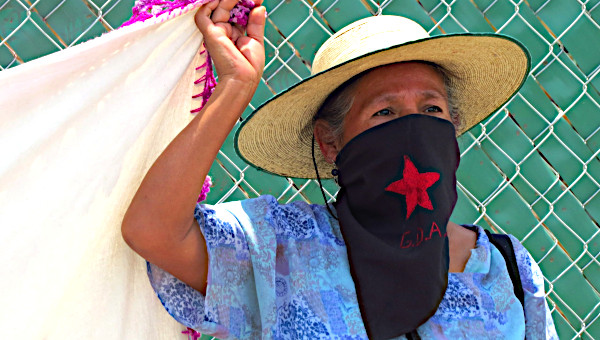
AS: Throughout the novel, we come to understand that there is a “System of Monsters” which is the main underlying “anti”-force destroying the potential abundance of well-being for both people and planet. The difference between charity and justice is also deeply explored. These are the underlying forces with which La Tortuga is destined to contend, and which are also inescapably entwined into all of our lives, in fact, with all life on Earth. Could you talk about systemic resistance and the pursuit of justice?
TP: As Eduardo Galeano is famous for saying, charity is vertical. The people who ‘give’ often dictate terms for the vulnerable folks on the receiving end. We need to look much more closely at the impact of aid and charity, and I try to touch on that in the novel. As mentioned above, there is often an inference of lacking in ability; that the reason some people don’t have a well is because they don’t know how to build one. So well-meaning Global North folks will visit some African country and build a well, often without bothering to ask people what they actually need, nor to examine why there are water supply issues in the first place. Had they asked, they might find that all the water is being redirected to European-owned mines, or to car-producing US-owned factories. Justice involves a lot more understanding than charity – that’s one of the things, but hopefully the novel has been able to elaborate on many of the differences.
AS: To conclude, it is becoming more and more urgent to humanize migrants and to politicize the issue of human migration and upstream systemic conditions. How has your work with migrants, refugees, workers, and activists informed your stories? And how have stories affected your activism?
TP: I’ve been working with a migrant shelter in Mexico City for the past eight or nine years. Refugees and migrants stay there as they seek asylum or visas in Mexico, or as they work or recover or save up to continue their journey to the US. People who think there is some kind of line or queue to get into the US have no idea just how difficult and complex it is to migrate. Let’s be clear, most people migrating through Mexico have little money and are sleeping in the street, sometimes in quite large encampments. The shelters, all volunteer-run and self-funded, aren’t enough, and sleeping in the street makes those people even more vulnerable to organized crime, illness – let alone making it hard to go through the bureaucracy of migration.
I wish that those who support militarizing and strengthening the borders could meet the characters I have met in the shelters, could hear about what they left behind, why they decided to flee or leave, and what they go through on their journey, including extortion (usually multiple times both by organized crime and migration officers), rape, kidnapping, robbery, etc. I tried to capture some of these migrants in the novel – as well as their agency (how they cope, what they think, what they want), and of course, the more I learn, the more I am convinced of the futility and harm of borders and the need for us to demand that refugees and migrants be treated with respect and care, rather than criminalized. •
This article first published on the Z Network website.


